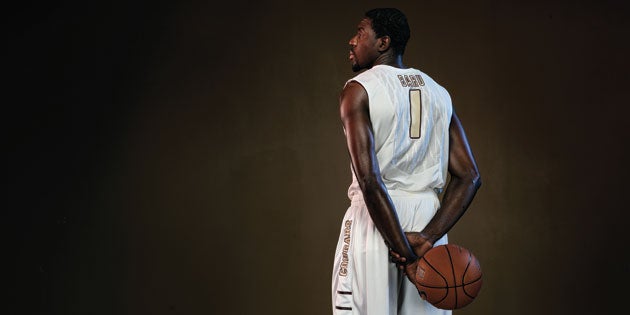All of the students graduating from the College of Charleston this spring are winners in their own right. They all have put in the work – and they all deserve credit. One standout among them is last season’s men’s basketball co-captain Adjehi Baru, the star recruit who was a mainstay for the Cougars for four seasons. As he crosses the Cistern Yard and receives his diploma on May 16, 2015, the international business major from the Ivory Coast can be sure that he’ll be forever remembered – and celebrated – for his example in the maroon and white.
A Force on the Inside
It’s sanctuary quiet. All seem frozen, deep in concentration, locked in an internal conversation best not disturbed. Perhaps over there, someone’s leg nervously jiggles or maybe someone else shifts his weight a little, but all is done without sound. For the most part, it’s a tableau of gangly statues adorned in white jerseys, broad-shouldered figures crammed into four rows of folding chairs in front of a white board in the middle of the men’s basketball locker room.
From behind, they might remind you of fighter pilots waiting for a war-room briefing. A battle, an aerial dogfight of sorts, is only a few minutes away. The seconds on the digital clock, hanging at eye level to their left, soundlessly tick backwards. The coaches, in an adjacent room, are making the final adjustments to the game plan against Delaware, last season’s Colonial Athletic Association champions.
For now, it’s just the players. The silence is temporary. It always is. Sounds begin to seep in, finding whatever seams and cracks there are between TD Arena’s locker room and the stands above. A familiar bass line, separated from its melody, thumps on the arena’s PA system, but, in here, it is only a distant heartbeat. It’s comforting in a way, something akin to the warm security of the womb. But that feeling vanishes with the short blasts of the pep band’s trumpets and the crash of cymbals, acting like faraway flashes of lightning in the mind’s eye.
Now, there is a soft shushing sound in the back of the room. Shh, shh, shh. It’s impossible not to feel its rhythm. To feel the circular motion of Adjehi Baru as he pedals on a lone stationary bike. Shh, shh, shh. It might even be soothing, like the sound of an early-morning rain, except that the clock is counting down, a flashing reminder of the work at hand.
Then the coaches enter. The sibilance is replaced by staccato clapping, the coaches yelling, “Here we go, here we go.” Suddenly, a pent-up energy is released in the room. All the players are clapping, nodding, smiling: The statues’ faces come to life. Everyone’s that is, but Baru’s, a white Powerade towel draped on his head like a warrior’s hood. He is pedaling, pedaling, pedaling. His face seems carved in obsidian: expressionless, yet full of emotion.

Adjehi Baru has the kind of dedication and determination that got noticed not just on the basketball court, but in the classroom, as well.
First-year head coach Earl Grant stands before the white board and runs through the game plan, 10 tactics to end the Cougars’ current seven-game losing streak. It’s rapid-fire instruction: “limit the transition,” “no refusal,” “bother the passer,” “emergency switch,” “flood the paint,” “deny, wall up and stay down,” “four Texas,” “shot fake,” “stick backs,” “inside out, no doubt.”
Grant then takes a deep breath and looks across the room. “I told you about the treasure,” he says. “Everybody’s got a treasure inside them. Everybody in this room has got something special about them. It might be to take a charge or get to a loose ball. Yours might be to have the most assists. Yours might be offensive rebounds. Yours might be to block a couple of shots. Yours might be to protect the rim. At the end of this game, we got to be sure that we can tell what your treasure was. Whatever it is, you do the best you can do with it, and we’re going to find a way to win. Let’s go, baby! Let’s go, baby!”
The players rise, some hop, some clap, some high-five one another. Baru leaves last. Slow. Silent. Focused.
The locker room is quiet for 20 basketball minutes. Then the door swings open and the players file back in. The Cougars are down by four points at the half.
One or two players go to the adjoining bathroom. Some, soaked in sweat, slouch into their chairs and drain entire water bottles. Baru again mounts the stationary bike and stays in motion: an attempt to keep his surgically repaired right knee from tightening up.
“Good job, team,” says Baru, his voice a deep bass with a soft French lilt. “We got to do this as a group. We got to talk to each other. Communicate.”
Heads nod in agreement. His voice seems to linger in the air, as if hovering near the four inspirational words etched on the white signs hanging above their lockers: Character, Passing, Trust and Toughness. Then, it’s quiet again, except for the shh, shh, shh sounds of Baru’s bike.
“We go all out tonight, guys,” says Baru, the intensity rising in his words. “All out. All out.”





